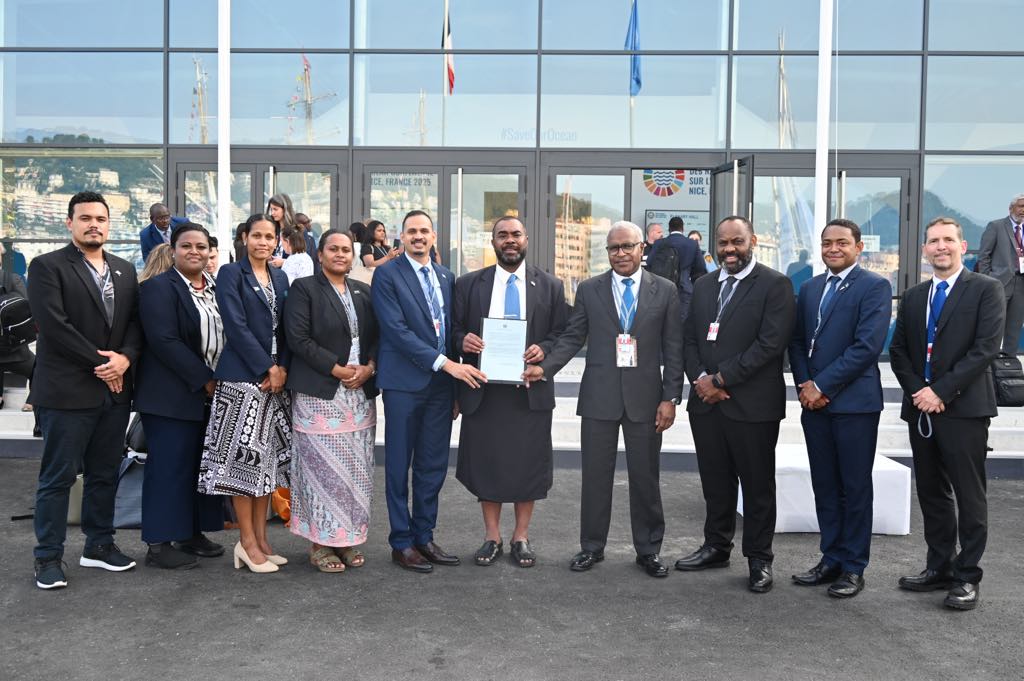As the world grapples with mounting threats to its oceans, Fiji has stepped up with a clear and deliberate move on the global stage.
At the United Nations Ocean Conference in Nice, France, the island nation officially ratified the Biodiversity Beyond National Jurisdictions (BBNJ) Agreement, a crucial step toward protecting marine life in international waters.
This was not just a formal gesture.
For Fiji, it was a firm commitment to defend the ocean that sustains its people, culture, and future and to play its part in shaping stronger global protections for the high seas.
“This gives us a seat at the table to make the rules,” said Dr Sivendra Michael, permanent secretary for Environment and Climate Change.
“It means we can embed Fijian priorities, like climate change and protecting marine species, into global ocean law.”
The BBNJ Agreement, often referred to as the “high seas treaty”, is a historic international pact that aims to safeguard marine biodiversity in areas beyond national jurisdictions.
These are waters that lie outside any country’s exclusive economic zone, often referred to as the high seas and until now, they have lacked clear legal protection.
For Fiji, an ocean state whose identity and economy are deeply tied to the sea, this moment is transformative.
Dr Michael said the agreement will help protect marine life in areas that previously operated in a grey legal zone.
“The BBNJ Agreement aims to scale up the conservation and sustainable use of marine biological diversity in areas beyond national jurisdictions, for the benefit of all,” he said.
He explained that the treaty provides clear legal guidance for activities in the deep seas and seabed, from regulating genetic resource sharing to establishing marine protected areas. Importantly, it also enhances global cooperation on critical issues like shipping, climate change, ocean pollution and resource exploitation.
“It addresses the gaps left by UNCLOS.
“Now, we will have frameworks for environmental impact assessments, benefit-sharing from marine genetic resources, and area-based management tools.”
The treaty’s timing is crucial.
The high seas face growing pressure from climate change, overfishing, deep-sea mining and pollution.
Without global guardrails, the most remote parts of the ocean are increasingly vulnerable.
Fiji’s ratification of BBNJ signals its determination to be part of the solution.
Dr Michael said that as a party to the treaty, Fiji can now influence how the rules are written and implemented.
“It strengthens multilateral diplomatic institutions and promotes international cooperation towards global conservation efforts,” he said.
“The Agreement establishes core obligations and principles that will advance collaboration around common goals, including meeting the Sustainable Development Goals (SDGs).”
He also highlighted a key win for small island developing states (SIDS) like Fiji: the inclusion of a principle on their special circumstances.
“We will now help define and build practice around this, integrating Fijian interests into Environmental Impact Assessments and Protected Area frameworks,” Dr Michael said.
The agreement lays out several focus areas. One of these is marine genetic resources, biological materials from ocean organisms that hold potential for medicine, food, and industry.
The treaty requires fair and transparent sharing of these benefits, something Dr Michael said was long overdue.
“The Agreement imposes robust notification requirements and ensures both monetary and non-monetary benefits are equitably shared,” Dr Michael explained.
It also introduces legally recognised marine protected areas beyond national borders, helping to guard biodiversity hotspots that are vital for species survival.
“These tools need to be balanced with food security and socio-economic objectives, including the protection of cultural values.”
Fiji’s leadership in ratifying BBNJ places it alongside other Pacific nations including Solomon Islands, Tuvalu and Vanuatu.
Regional cooperation is expected to strengthen, with joint voices pushing for fairer governance of the ocean commons.
“There is opportunity to strengthen multilateral institutions and promote international cooperation,” Dr Michael said.
“A strong BBNJ Agreement can enhance ecosystem health, preserve genetic diversity, and improve fish stocks.”
The treaty also aligns closely with Fiji’s national plans.
Dr Michael confirmed that the BBNJ objectives fit within the country’s National Ocean Policy and the Climate Change Act 2021.
“It will assist Fiji with monitoring and surveillance of high seas activities that may have cross-boundary impacts,” he said.
Implementation will be coordinated by the Maritime Affairs Coordinating Committee, chaired by the Ministry of Foreign Affairs and supported by several key agencies, including the Ministry of Environment and Climate Change, Fiji Navy, and the Ministries of Lands, Fisheries and Forestry.
For ordinary Fijians, particularly coastal communities, the treaty may seem distant. But Dr Michael said the benefits are real.
“Sustainable use and protection of high seas areas can reduce biodiversity loss and encourage revival of species local communities depend on,” he said.
This includes migratory species like turtles, humpback whales and hammerhead sharks that travel across maritime boundaries but hold deep cultural significance in Fiji.
Dr Michael added that the treaty complements Fiji’s goal of protecting 30 per cent of its ocean by 2030 and backs existing national laws, such as the Endangered and Protected Species Act 2002.
With the deposit of its ratification now complete, Fiji’s next steps include aligning national laws with BBNJ standards and ensuring its Environmental Impact Assessment procedures are compatible with international obligations.
“As an early ratifier, Fiji can influence decision-making from the start, attend the first COP and ensure our priorities are reflected,” Dr Michael said.
He also emphasised the opportunities for partnerships and capacity building, especially for smaller island states.
“The BBNJ Agreement promotes global equity.
“Right now, the high seas are managed in a way that is highly inequitable. This is our chance to fix that and create a governance system that works for everyone.”
From Suva to the global stage in Nice, Fiji has shown that even small nations can play a big role in shaping the future of our oceans.
By backing the BBNJ Agreement, Fiji is not just protecting distant waters, it is helping to secure a healthier, more sustainable ocean for everyone.



